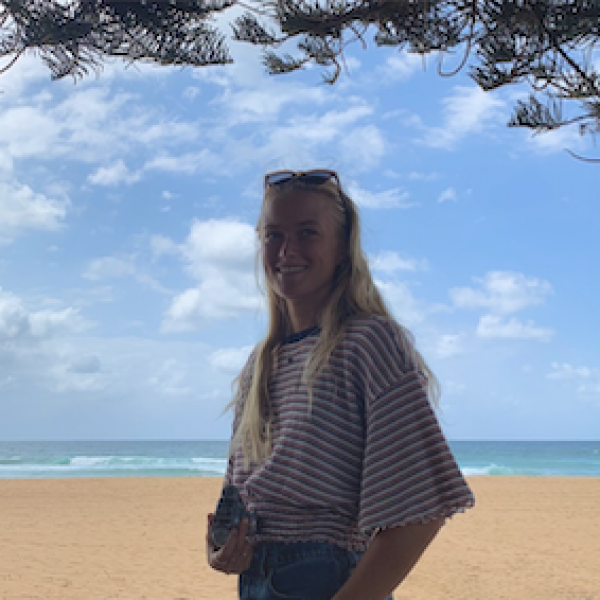
Creating a campus ecosystem app
Within the Bachelor of Science and Bachelor of Science (Advanced) degrees, students can undertake the ‘Interdisciplinary Challenges’ subject.
Students in this course must engage with an interdisciplinary challenge and explore how diverse science disciplines can come together to generate new solutions.
Students must work with a real client from the University of Newcastle and provide recommendations through a final professional report.
Both Nicole Couper and Timor Atkins completed this project as teammates.
Nicole is in her third and final year of a Bachelor of Climate Science and Adaptation after starting her studies in the Bachelor of Science with a major in environmental science.
While originally interested in physics and engineering, Timor is in his third year of a Bachelor of Science, majoring in statistics. He plans to graduate in 2024.
Nicole and Timor were tasked with adding value to the University of Newcastle’s campus ecosystem.
“We theorised a mobile application, where students and staff from the university could scan plants in the campus grounds, and gain rewards for doing so.
“The scanned plant type and coordinates would be saved into a database where future scientists, like Nicole and I, could analyse and model the species of flora on the campus.
“Users would gain higher rewards for targeted plants like invasive species, and we would have challenges like finding special species that were native to the east coast of Australia,” Timor said.
These rewards were designed to incentivise both staff and students while growing their general knowledge.
“Our app users would spend their points at the University for things like parking passes, money off at the cafes, free parking and money for printing!
“Using the data from the app, the University could use this knowledge to plan and implement an environmental management plan for the university campus,” Nicole said.
Both Nicole and Timor found that the multidisciplinary focus of their project allowed them to combine their strengths and produce creative results.
“I thoroughly enjoyed the teamwork factor that the interdisciplinary challenge had to offer.
“The mix of disciplines were great when gaining multiple perspectives on the issue, especially when researching and applying our knowledge throughout the report section of the course,” Nicole said.
“At times, some things got a little too creative!
“But with some convergent thinking strategic, we were able to rule out some options for the project,” Timor said.
After completing the program, Nicole believes that she has gained “a huge amount of knowledge”.
“Working in a team environment, decision making, report writing, and communication are a conglomerate of skills that I was able to develop, and I will carry these with me throughout my career,” she said.
Timor also feels that his newly developed skills in working with diverse teams will help in his future career as a statistician or data scientist.
“I will be working closely with people from a range of industries and I will need to communicate project outcomes to people with no knowledge of my discipline.
“I can now confidently adapt to new teams and carry my own strengths and perspectives into projects to achieve goals and targets,” he said.
Both Nicole and Timor are proud of the final product that they recommended and believe it could be incredibly impactful in the community.
“We believe that the app could benefit a greater population, not just targeted at the University, through the collection and analysis of invasive species that damage ecosystems,” Timor said.
The University of Newcastle Bachelor of Science degree is unique in that it provides such a depth of hands-on experience for students who can collaborate across multiple scientific disciplines.
“I personally chose the University of Newcastle as it was close to home, it offered degrees that were different to any other university in Australia, and I was able to complete both extremely hands on and theory intensive courses.
“This will help me in applying for industry work as I have experience in lab work, inspecting flora, fauna, water and soil samples, as well as a theoretical knowledge of human geography, spatial science, statistics and environmental remediation,” Nicole said.
Timor was personally drawn to the location, student pathway options, and the broad range of majors available in the Bachelor of Science.
“The Bachelor of Science degree appealed to me for the broad range of study options, flexibility with many electives, and employability skills gained from the program.
“My highlight has been gaining new skills like technical abilities, critical thinking, analytics, and technical skills,” he said.
Once Timor completes his degree, he plans to work as a statistician or data scientist in oceanography or meteorology, or work as a data analyst in a start-up company that helps communities.
When she graduates at the end of 2022, Nicole plans to take a gap year and travel before hopefully working on a sustainability team and making a positive impact on the planet.
“I am super excited to begin my next chapter. It’s pushing me to get better grades and start really putting in time to research my options!” Nicole said.
Learn more about the Bachelor of Science at the University of Newcastle

Nicole Couper and Timor Atkins
Nicole and Timor were tasked with adding value to the University of Newcastle’s campus ecosystem as part of their ‘Interdisciplinary Challenges’ course.
The Bachelor of Science degree appealed to me for the broad range of study options, flexibility with many electives, and employability skills gained from the program - Timor
The University of Newcastle acknowledges the traditional custodians of the lands within our footprint areas: Awabakal, Darkinjung, Biripai, Worimi, Wonnarua, and Eora Nations. We also pay respect to the wisdom of our Elders past and present.